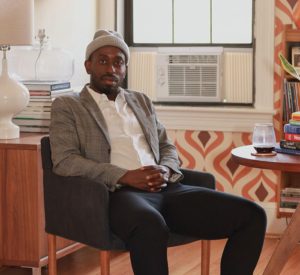2021 fiction alum Koye Oyedeji was recently featured in AGNI. Read an excerpt of “The Last Train” below:

The Last Train
I could tell it was her, even from afar: the self-serviced closecropped hair, her zany leggings, and the neon Nike Flight windbreaker she always wore, no matter the season. And since Raven had no business being on campus, I gave it all a second look, knowing something was either off or about to go off. She looked wild. Like she was ready to kirk on someone, pacing up down the path like she had all this extra energy. Then Mr. K stepped out the school and saw her, and when she saw him, she mean-mugged him so bad I had an oh-shit moment: the whole time she’d been waiting on a teacher, and it kinda made sense it would be him. He ain’t stop or approach her or nothing though; acted like he ain’t even know her and walked the path across the lawn to where I was, with other students, waiting to catch the D2 bus to DuPont Circle. Clearly, he had nothing to say to her, which also kinda sorta made sense. She wasn’t even a student at the school anymore.
At the bus stop, students bounced off the fencing and fooled around dangerously close to the road, like hardheaded monsters— their mama and all them PSAs ain’t teach them nothing about nothing. Everyone shouting too—like they couldn’t hear themselves speak. A mash-up of fluorescent leggings, slides with mismatched socks, stonewashed denim jackets thrown over hoodies. We were an arts school, so we wore what we wanted, sans uniform in the name of self-expression and all that, forever pushing the limits, bending shit where it won’t break, driving the dean crazy with pants that hung too low and designer tears that revealed too much thigh. And we got out late because of our arts classes, so we were always hungry, an appetite for home, for the skate park, or to link up with friends who already had a two-hour head start. I was never pressed about it, I didn’t have anywhere to run to. My day ones were a geek squad, boys who’d set themselves up with a homework club, math, English, algebra. No thanks. I just wanted to write. And home was never the ideal place for that after school, because by the time I made it back northeast, my nana would have all these different chores waiting on me.
I watched Mr. K scan the bus stop, searching for any kids from his department. Students he had lectured, argued with, drilled the importance of writing into—show not tell; make it clever, cool, and meaningful. His words. He was pressed, too, about us acting accordingly in the communal parts of the school. We were not to comport ourselves like them thirsty Studio Tech kids, to be as showy as the vocal department, or as outwardly tormented as the theater kin. That was their bag. We were young writers. Hard workers who shunned the spotlight.
He brushed his pencil tie, locked eyes with me. I nodded and he nodded back. Then he did this thing he does, where he’d say your name to formally acknowledge you. Because he was British, though he’d want you to tell it how he saw it: Black British of Nigerian descent. But whatever, too many words. On the one hand, weren’t nothing African about the way he said “Malik,” all extra like, as if he was the host on Masterpiece Theater, but on the other hand, there was something distinctly African about his being, his belief in education, about having a pick-yourself-up attitude and dusting yourself off no matter what got the drop on you; something about the way he looked through you and judged what you could do, not who you were. He was against laziness, against too much pleasure. His whole thing was “Just listen to me and you’ll be okay.” I could deal most times, but sometimes that shit be annoying. Acting like immigrants have a monopoly on hard work or something. Go on with that mess.
Read the rest of this story here: https://agnionline.bu.edu/fiction/the-last-train/












